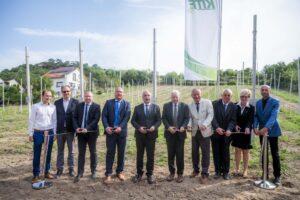Hungarian agriculture must respond to changing external conditions
Farmers must respond to rapid and drastic changes in the economic environment, weather conditions and consumer habits, and the Hungarian government will help this process in the future – promised the Minister of Agriculture on Friday in Pécs.

(Photo: AM/Csaba Pelsőczy István)
Nagy drew attention to the fact that due to the protracted Russian-Ukrainian war, the agricultural products of the neighboring country will probably remain present in Europe for a long time. The increasingly extreme weather and changing consumer habits also force Hungarian farmers to respond to the challenges facing them, to take steps to fill market gaps, and to place more emphasis on the cultivation of vegetables and fruits that also promise a decent profit. That is why the Hungarian government will continue to provide significant subsidies from this year and in the following years to those producers who see fantasy in modern technologies and would open up to the horticultural fruit and vegetable sector instead of mass production, because “this is where the market advantage is; everyone is looking for this,” he said. The minister pointed out: in the future, Hungarian grain growers will be unable to compete with Ukrainian farmers permanently present on the European market, who cultivate their hundreds of thousands of hectares of contiguous and high-quality land with the most up-to-date Western technologies possible, with extreme efficiency.
That is why the duty-free import of Ukrainian agricultural products caused a big problem
He explained: due to the complete exemption from customs duties for agricultural products granted to Ukraine by the European Union, thousands of times more Ukrainian products arrive in Europe compared to the previous period, which causes an insurmountable problem for EU farmers, especially those living in countries neighboring Ukraine, where they can deliver cheaply. According to the minister, the problem occurs in all agricultural sectors, but mainly affects grain growers and, more recently, honey growers. He stated: although the ban on the import of Ukrainian grain products is still in place and will remain until September 15, the Hungarian government will continue to insist on keeping it in force and – if there is no other way – will protect its own market, the Hungarian farmers, with national measures. He said: according to the solution proposed by the Hungarian government, a fund should be created to support the transit of Ukrainian agricultural products. In this way, it would be possible to deliver Ukrainian grain to its former destination countries, Africa and the Middle East, at a competitive price. In addition to the effects of unpredictable weather and people’s increasingly health-conscious eating habits, Hungarian farmers must also ensure that the sector is not left without young people. According to the minister, these challenges can be answered with well-thought-out, brave steps and developments, and in this regard, the government will continue to be a strong ally and “views the agricultural and food industry as a strategic, national security-level sector”, he said. István Nagy explained: in the EU budget cycle until 2027, HUF 5,400 billion will go to agriculture, and for rural development resources, Hungary will provide an unprecedented amount of 80 percent of national additional funding, which will provide three times more development than in the previous seven years. He emphasized that more than HUF 750 billion can be spent on the development of the manufacturing industry in the coming years. István Jakab, the Vice-President of the Parliament, the President of the National Association of Hungarian Farmers’ Associations and Farmers’ Cooperatives (MAGOSZ), the patron of the event, pointed out that even at the European Union level, farmers need to be able to respond to the challenges affecting agriculture, and for this, decision-makers who understand and help farmers need. László Őri, the chairman of the Baranya County Assembly, praised the fact that the government has been supporting agricultural actors, their developments, and local producers since 2010. The additional income of those living in agriculture serves to strengthen the local economy, he added. Zoltán Madaras, the host of the event, the president of the PTE Viticulture and Wine Research Institute (SZBKI), which manages 30 hectares of vineyards on the southern slopes of Mecsek, spoke about how they have been caring for and maintaining 1,800 grape varieties for about 70 years. In the future, they will also experiment with table grape varieties that are more resistant to diseases.
Before the event, in the presence of the Minister of Agriculture, PTE SZBKI’s new, 0.5 hectare organic table grape plantation was inaugurated with a capital of 650
The research institute would enrich the new plantation with additional varieties, currently 22 new grape varieties are being announced. At the event, István Nagy drew attention to the fact that in Hungary less than a quarter of table grapes are produced than people consume. The Ministry of Agriculture encourages initiatives that would improve this situation, he noted.
MTI
Related news
CBAM causes market disruption
🎧 Hallgasd a cikket: Lejátszás Szünet Folytatás Leállítás Nyelv: Auto…
Read more >The government provides significant funding to support the development of crop dryers
🎧 Hallgasd a cikket: Lejátszás Szünet Folytatás Leállítás Nyelv: Auto…
Read more >Agricultural vocational training also places great emphasis on irrigation development
🎧 Hallgasd a cikket: Lejátszás Szünet Folytatás Leállítás Nyelv: Auto…
Read more >Related news
Lidl guarantees fairer prices for cocoa farmers
🎧 Hallgasd a cikket: Lejátszás Szünet Folytatás Leállítás Nyelv: Auto…
Read more >40 secure jobs, sustainable solutions – new BURGER KING® in Csepel
🎧 Hallgasd a cikket: Lejátszás Szünet Folytatás Leállítás Nyelv: Auto…
Read more >








